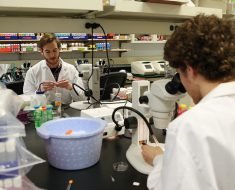(HealthDay)—Higher free triiodothyronine (fT3) levels, but not free thyroxine (fT4) or thyroid-stimulating hormone (TSH) levels, are associated with gestational diabetes mellitus (GDM), according to a study published in the July 1 issue of the Journal of Clinical Endocrinology & Metabolism.
Shristi Rawal, Ph.D., from the National Institutes of Health in Bethesda, Md., and colleagues conducted a case-control study in which thyroid markers (fT3, fT4, and TSH) were measured and the fT3-to-fT4 ratio was derived across four visits in pregnancy. Trimester-specific associations of thyroid markers with subsequent GDM risk were examined after adjustment for thyroid autoimmunity status and major GDM risk factors. Participants included 107 GDM cases and 214 non-GDM controls from a multiracial pregnancy cohort.
The researchers found that both fT3 and fT3-to-fT4 ratio were positively correlated with GDM (adjusted odds ratios, 4.25 and 3.89 comparing the highest versus the lowest fT3 quartile at first and second trimester, respectively). At the first and second trimester, respectively, the corresponding risk estimates for fT3-to-fT4 ratio were 8.63 and 13.6. There were no significant associations for TSH or fT4 with GDM. In the second, but not the first, trimester, isolated hypothyroxinemia was significantly related to increased GDM risk (adjusted odds ratio, 2.97 comparing hypothyroxinemic with euthyroid women).
Source: Read Full Article





